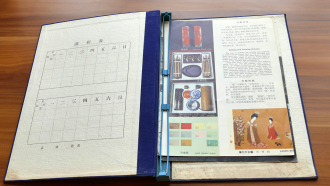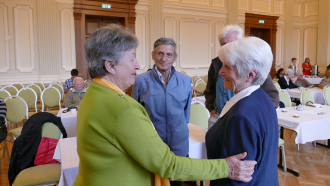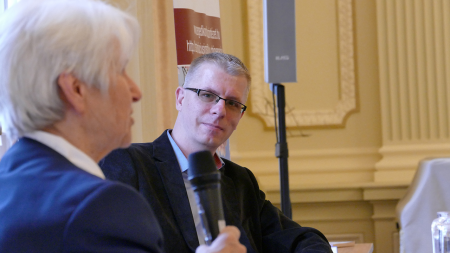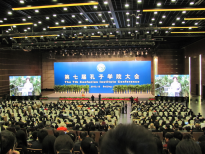University of Szeged, Konfucius Institute - Ahol tudás és szándék találkozik
 News
News
 CI NEWS ARCHIVES
CI NEWS ARCHIVES
 2015
2015
Kalmár Éva not only reads, but also translates Chinese novels

On 24 June 2015, Wednesday night, the newest illustrious guest of Confucius Tea House was Kalmár Éva sinologist and translator who is happen to be the daughter of the well-known Szegedien mathematician called Kalmár László. The host of the event was Mohr Richárd, Hungarian director of Confucius Institute at University of Szeged.
 It all began when the 12 year-old Éva accompanied his father to an international mathematician conference. This little girl met with a famous Chinese professor and they became such a good friends that the professor from far away wrote a little poem to the Hungarian girl which was a prediction. According to the prediction, as an important figure she will serve as a bridge between the two nations in means of cultural cooperation. At that time she couldn’t read the poem at all – she had been learning English only for a year – but soonly she had had the opportunity to learn more about this special language. After finishing high school, she applied for a Chinese scholarship in Beijing, and the following seven years had determined her whole life.
It all began when the 12 year-old Éva accompanied his father to an international mathematician conference. This little girl met with a famous Chinese professor and they became such a good friends that the professor from far away wrote a little poem to the Hungarian girl which was a prediction. According to the prediction, as an important figure she will serve as a bridge between the two nations in means of cultural cooperation. At that time she couldn’t read the poem at all – she had been learning English only for a year – but soonly she had had the opportunity to learn more about this special language. After finishing high school, she applied for a Chinese scholarship in Beijing, and the following seven years had determined her whole life.

It was in 1956 when Kalmár Éva first arrived to China and in the first year she was familiarizing and dealing with the language itself. Meanwhile, bad news arrived from her home, and when she returned to Hungary no one really cared about how is life in China. Moreover, the good relationship of the 50s between China and Hungary began to get worse, and after graduating from the university and returning back to Hungary in 1965 the diplomatic relation between the two countries came to its hollow point. Beforehand, numerous Hungarian artists and scientists visited this far away country, engineers physical workers worked for Chinese companies and later on economic, scientific and cultural relations died away. Kalmár Éva had a hard time in finding a job in her profession but finally she played an important role in popularizing Chinese theatre culture in Hungary. Later she started to deal with translation as well, and thanks to her a lot of people could get acquainted with the masterworks of Chinese writers. One of the most famous one which is entitled the Wild swamps which was written by a well-known Chinese writer living in London. This family novel introduces the history of China during the 20th century.

A couple of words about traditional Chinese medicine was also mentioned which is basically different from the European medical way of thinking. Western type of medical science is searching for the cause of sickness, while Chinese analyze the whole body and they explain the occurring problems by the disruption of inner balance. As we have found out from Kalmár Éva, Petőfi became popular in China because his name was mentioned in an essay written by a very famous Chinese writer and therefore it became part of the Chinese curriculum. The professor said that there is a huge difference between the two cultures, however, if it is coupled with mutual respect, both nations can benefit from the relationships. If we learn each other’s way of thinking then this huge difference won’t cause any barrier anymore.




